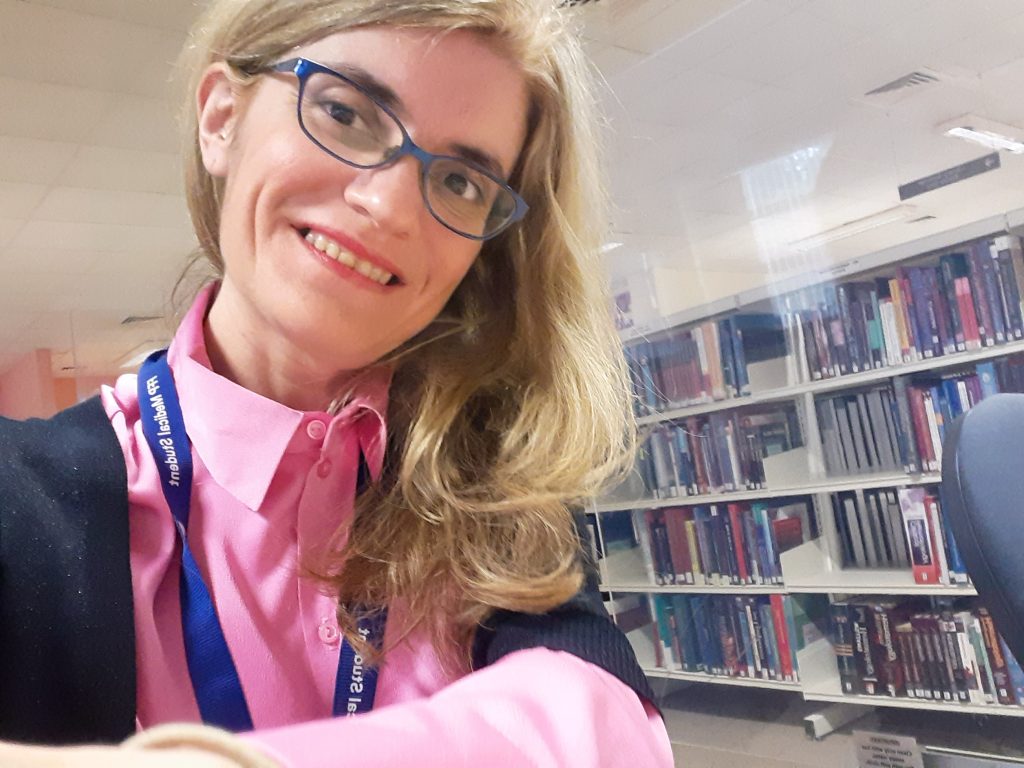November 18, 2022, by School of Medicine
Disability Recognition Month: Studying Medicine with a chronic disability
 My name is Dana, I am a 4th year medical student…
My name is Dana, I am a 4th year medical student…
This is the typical opening sentence for clinical skills sessions, whenever there are interactions with patients or other healthcare professionals during placements, and last but not least, during the feared OSCEs. I would like to add today to that opening sentence: My name is Dana, I am a 4th year medical student with a chronic disability. It is not something that is usually said, but thanks to the University of Nottingham, disability and all students who suffer from it will have their recognition and exposure in the commendable initiative of the Disability Recognition Month.
So, it is my turn to talk a bit about my disability and what it is like to be a training doctor suffering from it.
I have a diagnosis of CPTSD (complex post traumatic stress disorder) after experiencing devastating traumatic events during childhood. I also have a diagnosis of chronic kidney condition and POTS (postural orthostatic tachycardia syndrome). What this means is that there are times when acute episodes occur during which I must undergo intensive treatment (more recently frequent hospitalisations last academic year for acute kidney injury and sepsis which have amounted to losing 4 weeks of FFP placement, at the very beginning of it).
But the impact is quite consistent on my everyday life, too. There is a list of everyday occurrences which influence my overall functionality in life ranging from chronic pain, at times moderate and bearable, at times less so; fainting episodes; psychomotor retardation; feeling fatigued more than I would like it to be. On the emotional side, the unpalatable legacy of CPTSD is a chronic lack of confidence, dealing everyday with imposter syndrome and this despite previous academic successes (a PhD in bioethics and postdoctoral research associate appointment in Princeton University). It is more of a state of mind about feeling different, wrong, inadequate, the wrong tassel in an otherwise perfectly ordered puzzle than other. And proven academic success struggles to fight and defeat a state of mind the illness has made a feature of my personality. On an emotional level there is also the constant uncertainty, the fear that another acute relapse will land me in hospital, and not allow the continuation of medical studies. And on top of it all, the profession of medicine, despite progress on this aspect, is still too much centred on the unattainable ideal of the doctor as a superhuman agency. When you have a disability, an underlying feeling of inadequacy and isolation for a body and my mind not meeting the narrative of the superhuman doctor develops.
What is it that the university has done for me to make the dream of becoming a doctor possible despite all the above limitations? I declared my disability from the beginning and from the very start I had a bespoke support plan, frequent follow ups with outstanding mental health care professionals from mental health advisory support and from the wellbeing group. And I’ve had a tutor who has always been there for me through thick and thin giving me outstanding practical and emotional support.
To the other students suffering from a disability and attending the University of Nottingham I would confidently say: do not be shy, talk openly and ask for support. The University of Nottingham will do their best to help you. With me, thanks to the outstanding support received, I hope one day I will be able to say: My name is Dana, a consultant nephrologist…
Dana Rinaldi, 4th Year Medical Student, Graduate Entry Medicine
No comments yet, fill out a comment to be the first

Leave a Reply